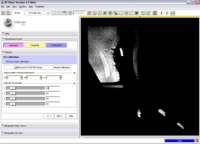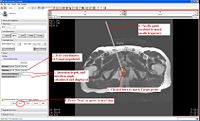Difference between revisions of "DBP2:Queens"
| (20 intermediate revisions by 6 users not shown) | |||
| Line 1: | Line 1: | ||
| − | Back to [[DBP2:Main|NA-MIC DBP 2]] | + | Back to [[DBP2:Main|NA-MIC DBP 2]] |
__NOTOC__ | __NOTOC__ | ||
| − | = Overview of | + | = Overview of Queens DBP 2 = |
| − | == | + | == Image-Guided Percutaneous Surgery == |
| − | The Queen’s & Hopkins teams are developing novel systems and procedures for prostate cancer | + | The Queen’s & Hopkins teams are developing novel systems and procedures for image-guided percutaneous needle-based surgical procedures. We develop a closely related family of systems guided by magnetic resonance imaging (MRI) for the diagnostics and treatment of prostate cancer and musculoskeletal conditions. The overall objective of this DBP is to create working clinical applications based on the NAMIC toolkit, namely Slicer and ITK/VTK tools. '''[[DBP2:Queens:Introduction|More...]]''' |
| − | + | Data is provided at the following link: '''[[Data:DBP2:Queens|Queens Data]]'''. | |
| − | + | = Queens Roadmap Project = | |
| − | = | + | {| cellpadding="10" border="1" style="background:lightblue;text-align:left;" |
| − | + | | style="width:15%" | [[Image:TRProstateBiopsyModule.png|200px]] | |
| + | | style="width:85%" | | ||
| + | |||
| + | == [[DBP2:Queens:Roadmap|Prostate Biopsy Needle Positioning Robot Integration]] == | ||
| + | |||
| + | The Queen’s/Hopkins team is developing novel devices and procedures for cancer interventions, including biopsy and therapies. Our roadmap project involves the development of an application for image-guided trans-rectal biopsy, utilizing a needle positioning robot with an integrated MRI RF coil. [[DBP2:Queens:Roadmap|More...]] | ||
| − | | style="width:15%" | [[Image: | + | |} |
| + | |||
| + | = PERK Station = | ||
| + | |||
| + | {| cellpadding="10" border="1" style="background:lightblue;text-align:left;" | ||
| + | |||
| + | | style="width:15%" | [[Image:PerkStationModule.JPG|200px]] | ||
| style="width:85%" | | | style="width:85%" | | ||
| − | == [[ | + | == [[DBP2:Queens:PerkStation|Hardware/software overlay for percutaneous intervention (PERK Station)]] == |
| − | |||
| − | |||
| − | + | The Queen’s/Hopkins team is developing novel devices and procedures for cancer interventions, including biopsy and therapies. This particular project involves design and development of a hardware/software system that can be used in either clinical mode to perform an intervention or in training mode to objectively evaluate the performance of trainee doing a percutaneous needle intervention on a phantom. [[DBP2:Queens:PerkStation|More...]] | |
|} | |} | ||
Latest revision as of 18:09, 6 January 2010
Home < DBP2:QueensBack to NA-MIC DBP 2
Overview of Queens DBP 2
Image-Guided Percutaneous Surgery
The Queen’s & Hopkins teams are developing novel systems and procedures for image-guided percutaneous needle-based surgical procedures. We develop a closely related family of systems guided by magnetic resonance imaging (MRI) for the diagnostics and treatment of prostate cancer and musculoskeletal conditions. The overall objective of this DBP is to create working clinical applications based on the NAMIC toolkit, namely Slicer and ITK/VTK tools. More...
Data is provided at the following link: Queens Data.
Queens Roadmap Project

|
Prostate Biopsy Needle Positioning Robot IntegrationThe Queen’s/Hopkins team is developing novel devices and procedures for cancer interventions, including biopsy and therapies. Our roadmap project involves the development of an application for image-guided trans-rectal biopsy, utilizing a needle positioning robot with an integrated MRI RF coil. More... |
PERK Station

|
Hardware/software overlay for percutaneous intervention (PERK Station)The Queen’s/Hopkins team is developing novel devices and procedures for cancer interventions, including biopsy and therapies. This particular project involves design and development of a hardware/software system that can be used in either clinical mode to perform an intervention or in training mode to objectively evaluate the performance of trainee doing a percutaneous needle intervention on a phantom. More... |